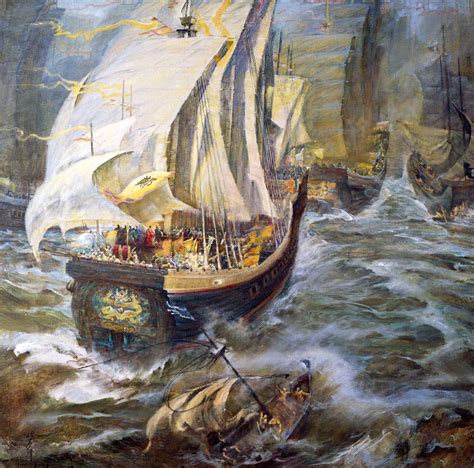Zheng He, the renowned Ming admiral known for his extensive explorations during the 15th century, hailed from Kunyang (present-day Jinning, Yunnan Province) in China. Born into a Muslim family in 1371, Zheng He’s early life shaped his worldview and played a significant role in his later voyages.

Early Life and Influences
Growing up in Kunyang, Zheng He was exposed to a cosmopolitan environment. Kunyang served as a crucial hub for Silk Road trade routes, fostering cultural exchange and the spread of Islamic teachings. The city’s Muslim community provided a nurturing environment for Zheng He, who embraced the tenets of Islam and adopted the name “Hajji.”
Zheng He’s knowledge of navigation and astronomy, essential for his future expeditions, likely stemmed from his Muslim mentors and tutors. The Islamic world had made significant advancements in these fields, and Zheng He’s connections to Muslim scholars granted him access to their knowledge and technologies.
Rise to Prominence
Zheng He’s exceptional abilities and unwavering loyalty caught the attention of the Ming emperor, Yongle. In 1405, Yongle appointed Zheng He as the commander of the Imperial Fleet, tasked with leading expeditions to explore and establish diplomatic relations with foreign lands.
Expeditions and Discoveries
Over the next two decades, Zheng He led a series of seven maritime expeditions that extended the boundaries of Ming influence and knowledge of the world. His fleets sailed across the Indian Ocean, reaching as far as East Africa and the Arabian Peninsula.
Zheng He’s expeditions had profound cultural and scientific impacts. He established trade relationships with foreign nations, bringing exotic goods and new technologies to China. His voyages also facilitated the exchange of ideas and cultural practices, contributing to the spread of Chinese culture and the adoption of foreign influences in Ming China.
Legacy and Impact
Zheng He’s explorations left an indelible mark on history. He is widely regarded as one of the greatest maritime explorers of all time, comparable to Christopher Columbus and Vasco da Gama. His expeditions provided valuable geographical knowledge, promoted diplomatic relations, and stimulated trade and cultural exchange.
Geographic Discoveries
Zheng He’s voyages expanded China’s understanding of the world. His fleets mapped coastlines, charted islands, and discovered new territories. His expedition logs and maps became essential navigational aids for future Chinese explorers and European sailors who later ventured into the Indian Ocean.
Diplomatic Relations
Zheng He’s expeditions established diplomatic ties with numerous Southeast Asian, Indian, and Arabian nations. He negotiated treaties, mediated disputes, and fostered trade relationships, enhancing China’s status as a global power.
Cultural Exchange
Zheng He’s voyages facilitated the exchange of cultural practices, technology, and knowledge. He introduced gunpowder, printing, and other Chinese innovations to foreign lands, while bringing back exotic animals, plants, and cultural treasures to China.
Tables
Table 1: Zheng He’s Expeditions
| Expedition | Duration | Destinations |
|---|---|---|
| 1st | 1405-1407 | Southeast Asia, India |
| 2nd | 1407-1409 | Southeast Asia, India, Ceylon |
| 3rd | 1409-1411 | Southeast Asia, India, Ceylon, Hormuz |
| 4th | 1413-1415 | Southeast Asia, India, Ceylon, Hormuz, Aden |
| 5th | 1416-1419 | Southeast Asia, India, Ceylon, Hormuz, Aden, Saudi Arabia |
| 6th | 1421-1423 | Southeast Asia, India, Ceylon, Hormuz, Aden, Saudi Arabia, East Africa |
| 7th | 1431-1433 | Southeast Asia, India, Ceylon, Calicut |
Table 2: Geographic Discoveries Made by Zheng He
| Discovery | Importance |
|---|---|
| Java | Traded spices and other goods |
| Malacca | Strategic Strait of Malacca trading port |
| Calicut | Major trade center in India |
| Hormuz | Strait of Hormuz controlling trade in the Persian Gulf |
| Aden | Red Sea port for trade and pilgrimage |
| Mecca | Islamic holy city established diplomatic relations |
| Malindi | East African port for trade in ivory and gold |
Table 3: Cultural Exchange Facilitated by Zheng He
| Import | Export |
|---|---|
| Gunpowder | Tea |
| Printing | Silk |
| Porcelain | Jade |
| Exotic Animals | Paintings |
Table 4: Impact of Zheng He’s Expeditions
| Impact | Effect |
|---|---|
| Geographic Knowledge | Expanded China’s understanding of the world |
| Diplomatic Relations | Enhanced China’s status as a global power |
| Cultural Exchange | Facilitated the spread of Chinese and foreign cultures |
| Trade and Commerce | Stimulated trade and economic growth |
